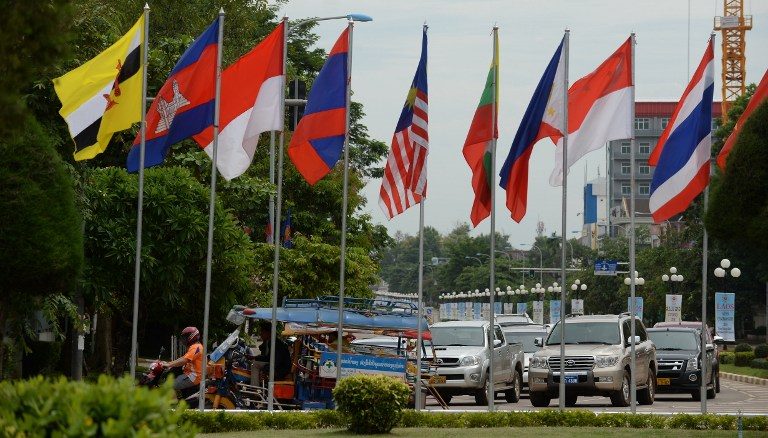SUMMARY
This is AI generated summarization, which may have errors. For context, always refer to the full article.

MANILA, Philippines (3rd UPDATE) – The Association of Southeast Asian Nations (ASEAN) ignored the recent ruling of a UN-backed tribunal on the maritime disputes in the South China Sea, in a statement released Monday, July 25.
The ruling from the Permanent Court of Arbitration (PCA) last July 12, which stated that China’s claims over a wide swath of the South China Sea is baseless under international law, was not mentioned in the joint communique released at the end of the 49th ASEAN Foreign Ministers Meeting in Vientiane, Laos.
Instead, the 10-nation regional bloc said that they “remain seriously concerned over recent and ongoing developments and took note of the concerns expressed by some Ministers on the land reclamations and escalation of activities in the area, which have eroded trust and confidence, increased tensions and may undermine peace, security, and stability in the region.”
The communique also emphasized “the importance of non-militarization and self-restraint in the conduct of all activities, including land reclamation that could further complicate the situation and escalate tensions in the South China Sea.”
Avoiding a mention of the ruling from the Hague-based tribunal will be seen as a victory for the regional giant.
Beijing wins the day
Asked if Monday’s statement had been watered down one diplomat involved in the talks simply said “we had to come out with a statement,” adding “we don’t want the world to say that ASEAN is in disarray.”
The decision is a boon to China and it quickly praised Cambodia – to whom it ladles out aid and loans – for holding out against fellow members.
Beijing also thanked other staunch ally Laos for remaining “objective” during discussions.
At a press conference after the statement was issued, Wang said regional leaders had “made it very clear that ASEAN does not take sides on the arbitration case or the so called ruling”.
He also accused countries outside the region of “keeping the temperature high” over the sea, a clear rebuke to the United States.
After meeting Wang for talks late Monday Kerry remained upbeat describing the US relationship with China as “the most consequential bilateral relationship on the globe”.
“We have differences… and we work to manage those differences,” he added.
The US says it takes no position on the territorial disputes but argues for free sea and air passage through what it considers international waters.
It has called on Beijing to accept the tribunal ruling.
Earlier speaking to Southeast Asian ministers Kerry said the US would continue to push “a rules-based international system that protects the rights of all nations whether big or small”.
‘Compromise statement’
The summit of the ASEAN foreign ministers in Laos was the first one since the ruling was released by an arbitral tribunal at the PCA.
Diplomats gathered in Vientiane spent days wrangling over how to respond to this month’s ruling by a Hague-based tribunal which delivered a hammer blow to most of China’s historical claims over the region.
Four ASEAN members – Vietnam, the Philippines, Malaysia and Brunei – have competing claims with Beijing over parts of the South China Sea.
Most members of the bloc want to keep pressure on China over its campaign of island building in the strategic waters.
But ASEAN operates on a tradition of consensus diplomacy, meaning a single nation can have an effective veto power if it disagrees with the others.
China has been accused of teasing poorer members like Laos and Cambodia into fracturing regional unity with promises of aid and trade.
The statement was finally released on Monday after last-minute talks finally found a way through the impasse. But it was clear Cambodia’s intransigence had carried the day.
“We just averted another potential debacle,” one Southeast Asian diplomat told Agence France-Presse, referring to a 2012 summit in Cambodia where the bloc failed to issue a joint statement for the first time because of disagreements on the South China Sea.
Another diplomat, when asked if Monday’s statement had been watered down, said: “It’s a compromise statement. And in a compromise someone has to give way.” – With reports from Agence France-Presse / Rappler.com
Add a comment
How does this make you feel?
There are no comments yet. Add your comment to start the conversation.